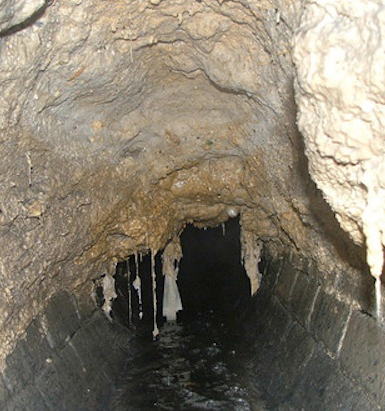Fatbergs build in flushing folly
 While they might be cheap on supermarket shelves, disposable wipes are costing water authorities tens of millions of dollars.
While they might be cheap on supermarket shelves, disposable wipes are costing water authorities tens of millions of dollars.
The wipes are typically flushed down the toilet, which leads to clogged pipes and polluted waterways.
When they mix with fatty substances in the sewers, these wipes form what is known as a ‘fatberg’, which authorities fear could cripple the system.
In an interview with the ABC this week, Michelle Cull from Queensland Urban Utilities said the problem is getting worse, despite constant attempts to educate the public.
"I think a lot of people just aren't aware that they shouldn't be putting wet wipes down the toilet," she said.
"A lot of the wipes are labelled as flushable but the message we are trying to get out is that just because they can be flushed doesn't mean they should be flushed.
"We do believe it is getting worse; when we talk to our field crews that go out and work at our pump stations they are noticing a lot more wipes going through the network.
"The big issue is that wipes don't disintegrate like toilet paper does. We remove around 120 tonnes of wipes from the system [in South-East Queensland alone] every year."
Water Services Association of Australia executive director Adam Lovell told reporters that water authorities nationwide were struggling to cope.
"We are unfortunately seeing an increasing frequency of sewage blockages," Mr Lovell said.
"The problem has really exploded over the past couple of years and it's costing millions to fix up.
"Sydney Water estimates it costs around $8 million a year to fix blockages caused by wet wipes and they find 75 per cent of their sewage blockages involved wipes of some description."
Mr Lovell said a fatberg was one of his greatest fears.
"Fatbergs are horrible – they're basically absolutely huge, tonnes in weigh ... and what happens is of course these fatbergs contain quite a lot of these wipes that make them even bigger," he said.
"You've got to rip roads, you've got to rip out footpaths and parks to get these things out. They're certainly not the most pleasant thing to look at and not the most pleasant thing to smell either."
Mr Lovell said it may take strong intervention to stop the fatbergs growing, such as the action taken by the Federal Trade Commission in the United States.
"They've actually put the onus on the wipes manufacturers to prove that the products are flushable before they can be labelled as flushable, and that's a major step forward, and we will be looking at that here closely as well," he said.
"We've met with the various manufacturers and retailers of wipes, we are sharing information at the moment. We are also looking to set up a mirror standards committee which is coming out of the US to determine what is flushable, to put that standard around flushability."
Queensland Urban Utilities worker Steve Gibson described the horror accumulating at the Boondall treatment plant where he works.
"That's probably a four-metre screen almost completely covered in wet wipes. [There's also] a little bit of corn; we always get corn," he said.
"[A fatberg] looks pretty ugly; it's not something you would want to put between two bits of bread, that's for certain.
"It costs us a lot of money each year to dispose of these to landfill when the easiest way to deal with them is for people not to flush them down the toilet."








 Print
Print